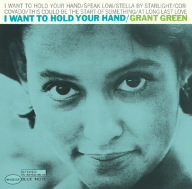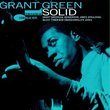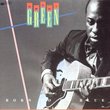| All Artists: Grant Green Title: I Want to Hold Your Hand Members Wishing: 4 Total Copies: 0 Label: Blue Note Release Date: 4/12/2005 Album Type: Import, Limited Edition, Original recording remastered Genre: Jazz Styles: Soul-Jazz & Boogaloo, Bebop Number of Discs: 1 SwapaCD Credits: 1 |
Search - Grant Green :: I Want to Hold Your Hand
 | Grant Green I Want to Hold Your Hand Genre: Jazz
One of Grant Green's three great sessions with organist Larry Young and drummer Elvin Jones. Hank Mobley joins the trio for beautiful explorations on "Speak Low" and "Stella By Starlight" as well as two contemporary tunes:... more » |
Larger Image |
CD DetailsSynopsis
Album Description One of Grant Green's three great sessions with organist Larry Young and drummer Elvin Jones. Hank Mobley joins the trio for beautiful explorations on "Speak Low" and "Stella By Starlight" as well as two contemporary tunes: "Corcovado" and the title track. [Super Bit Mapping] Personnel: Grant Green (guitar); Hank Mobley (tenor saxophone); Larry Young (organ); Elvin Jones (drums). Similar CDs
|
CD ReviewsI Want To Hold Your Hand, (a guitarist's album) Chris Covais | 03/20/2005 (4 out of 5 stars) "I Want To Hold Your hand is an album by Grant Green that was made because Green wanted to and said that he took the route that Wes Montgomery did, covering pop tunes and gaining more recognition. Sadly, unlike Montgomery, Green didn't have any popular success with these albums, but they make for very nice swinging sets. This album is truely an album for guitarists to study if they are learning jazz guitar. Listen to his sound and his dexterity. Other than that, this album is far from the greatest album in Green's cataloge. The opener, I Want To Hold Your Hand is very beautiful. It took me a while to figure out what song it was from hearing it, but that was just because of Green's gift for song interpertation. The song definately sounds like a 1960's Bachelor music hit, but unfortunately it was not. Maybe due to lack of distribution, and it being on a strictly jazz label as where Montgomery's hits were on A&M Records. As the rather boring, bossa nova craze was sweaping the country it had its ties and impact on jazzers. Corcovado (Quiet Nights) written by who else, but Antonio Carlos Jobim, swings. The best of the rest are Speak Low and Stella By Starlight. The neat trio consisting of Larry Young on organ, Elvin Jones, (RIP) on drums, and Green on guitar are complimented with Hank Mobley on tenor who dropped by for the session. This is somewhat of a classic, but there is much more by Green to check out. Idle Moments, Street Of Dreams, Green Street, Solid, and many more during his run on Blue Note Records." Grant & Co. Know How To Hold Your Attention Brian Schiff | Detroit Mi. USA | 11/09/2005 (5 out of 5 stars) "Years ago,I used to hear the title tune,'I Want To Hold Your Hand' played constantly on local jazz radio;so I was pretty sure I wasn't alone in thinking it was my favorite number played by a great jazz guitarist.Green,along with Hank Mobley on tenor sax,Larry Young on organ and Elvin Jones on drums do this in a medium tempo with a beautifully done balanced attack by all the cats.The entire album is basically medium-tempo,but turns it up for 'Speak Low'. This is my favorite Grant Green album-and I don't think anybody ever played guitar better." A Minor Masterpiece (this is one reassuring hand you won't w Samuel Chell | Kenosha,, WI United States | 06/12/2008 (5 out of 5 stars) "The Beetles and jazz are about as likely a combination as Southern Comfort and prune juice. Compound the crime with an inferior Beetles song used as the title of the session and it's a wonder this one ever saw reissue as a CD. Thank goodness it did, because the date is a sheer groovin' delight.
Grant Green's technical skills are, in some respects, relatively modest, yet I can't recall anyone coming any closer to Wes Montgomery than Green does while extracting from the guitar a fat, resonant sound, getting extra color and interest from the vibrations of each string, as though the tone were doubling itself. Even when he gets a bit hung up in his lines, or hooked on a riff, he's rewards attentive listening. The previous Swedish reviewer is on target about the inventiveness of the guitar solo on "This Could Be the Start," but Green's production of sound is equally arresting. Why do Russell Malone, Ulf Wakenius, Herb Ellis, Jimmy Raney, Jim Hall, Frisell and any number of players settle for such a light, "surfacy," frequently "muted" sound? And it's not a matter of electronics, amplification or flirting with distort pedals. Green "grabs" the string and wrings every last juicy overtone from a note. (Wish I'd known about this version when I had dinner and a long conversation with the composer of "This Could Be the Start," Steve Allen--I couldn't think of much to say about the song other than it sounded like a "vaudeville" opener, an observation Allen assured me was mine alone.) Green also comes up with an inspired, emotional statement on another tune which, like the Beetles and Allen songs, is rarely performed as an instrumental: on Cole Porter's "At Long Last Love" his melodic lines breathe with vocal-like expressiveness. Larry Young is the organist who during this period succeeded more completely than any other in removing the instrument from the church. If you can't take too much of J. Smith, Groove Holmes, J. McGriff, etc., don't throw out the baby with the bath water. Young at this time had a modernist approach rivaled only by Wes' organist, Melvin Rhyne. He makes the sanctified behemoth sound like a sedate, smoldering (not sizzling) siren, incapable of overstaying and wearing out its welcome. The recording was made around the time of "A Love Supreme" and of Elvin's parting company with Coltrane. But you'd never guess he was "THE" progressive, eruptive, polyrhythmic drummer extraordinaire from the tasteful, in-the-pocket work (mostly on brushes) he submits on this occasion. Elvin's straightahead playing here makes more understandable his decision to hook up with the Ellington band for a brief stint in '65 (of course, Duke wasn't about to fire Sam Woodyard, so Elvin had to endure being a side-kick which, I know from talking to both drummers, went down no better with Sam than Elvin). Hank Mobley--for my money there was none better before 1966 (notwithstanding his apparent anemic showing on the two-tenor match-up with Coltrane on Miles' Columbia date "Someday My Prince Will Come"). Count on Mobley to make melodic magic out of any harmonic progression, even some of the nasty ones selected on this session. Dig his simple but eloquent solo on the title tune, in effect "setting the stage" for Green; then listen to his flowing, continually inventive and melodically-rich work on the following, uptempo "Speak Low." The man can do no wrong. Unfortunately, Mobs doesn't get an opportunity on "This Could be the Start," and as good as Green is on the tune, the date suffers for the brief absence of the tenor great. "I Want to Hold" was obviously another of Blue Note's desperate attempts to replicate Wes' success at A&M records. It's a refreshing change from the label's repeated efforts to come up with yet another "Sidewinder" (the original wasn't that great). But Alfred Lion, Francis Wolf, and Van Gelder had run out the string once Jimmy Smith got a better offer--a glorious run, approximately 30 years, beginning with Sidney Bechet and ending with the "Incredible" (Lion's designation) Boss of the B3. Today, the label is precisely that--a label, or rubric, employed by EMI records for marketing purposes. Imagine the unlikelihood, if not completely absurdist notion, that a 1965 guitar/B3 jazz session featuring "I Want to Hold Your Hand" would sound fresh, vital, inexhaustible nearly half a century later! This recording is a minor masterpiece, a glittering gem, a timeless honey of a session, a constant companion and welcome friend that you'll want to keep close at hand at all times. However you store and play your music, be extra careful that this deceptively innocuous and polite little recording doesn't become "parted out" and subsequently buried in that vast virtual junkyard of MP3 files that fragments human experience and levels life's meaningful musical moments to the same muted monotone." |

 Track Listings (6) - Disc #1
Track Listings (6) - Disc #1
